Teachers Union Slams Heavy Prison Sentences For Eight Activists
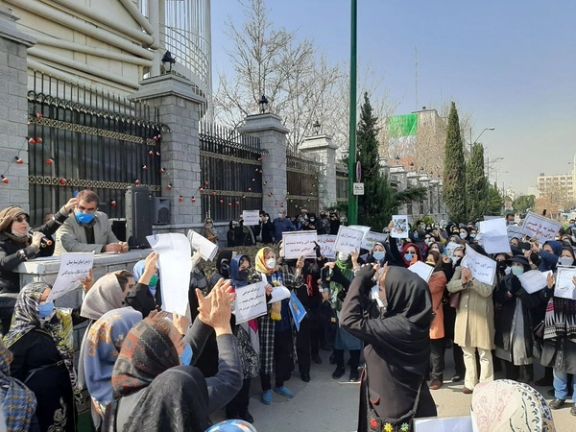
Iran’s Fars Province Teachers Union condemned the collective sentence of eight teachers to 34 years in prison.

Iran’s Fars Province Teachers Union condemned the collective sentence of eight teachers to 34 years in prison.
In court, their participation in the legal gatherings of teachers was branded "collusion against the system" by judges.
The authors of the statement, referring to Article 27 of the Constitution of the Islamic Republic of Iran regarding the freedom of peaceful trade union gatherings, asked the judge and the agents involved in issuing the verdicts to "reconsider their decision for these honest teachers as soon as possible."
They said participation of teachers in such events is in line with "improving the state of education" as a necessary thing for "the growth of the society and the progress of the country".
They further called for "the revocation of the unjust verdicts and their acquittal in the appeals court".
The eight were among 26 teachers from Fars province who in May last year were detained during the union protests on the charge of "gathering against national security".
The arrest of teachers and transferring them to jails in different cities has escalated after they protested to condemn chemical attacks on schools and poisoning of female students, as well as the non-payment of salaries and arrears.
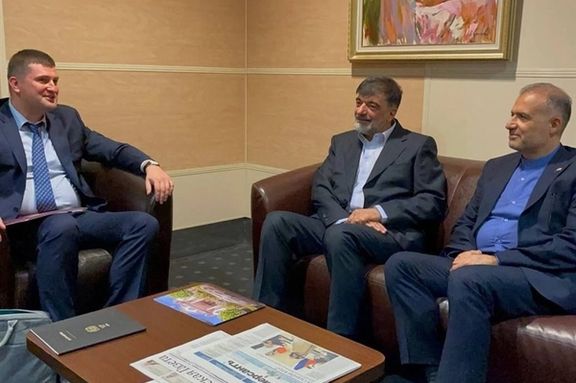
Iran's police chief visiting Moscow signed a long-term memorandum of understanding Wednesday with the director of the Russian National Guard (Rosgvardiya).
As part of his official visit Ahmadreza Radan, a general notorious for repressing protests, met with General Viktor Zolotov.
The TASS news agency reported that the two sides discussed cooperation and exchange of experiences in law enforcement and "fighting terrorism and extremism."
"The document provides for an exchange of experience in law enforcement, protection of crucial government facilities, combating terrorism and extremism, and providing support for measures to counter crime," the press service added.
Before the meeting, the Iran in delegation visited the central museum of Rosgvardiya to view the latest models of weapons and special equipment. In addition, dog trainers and members of the rapid reaction unit demonstrated their skills at neutralizing armed criminals.
Nikolai Patrushev, secretary of the Russian Security Council, also spoke earlier on Wednesday with Iran's police chief.
Earlier, Alexei Zhuravlev, First Deputy Chairman of the State Duma Committee on Defense, suggested that Radan would discuss with Patrushev the fight against terrorist organizations in Eurasia and alleged plots by Western intelligence agencies to destabilize" the situation in Russia and Iran.
“It is possible to exchange experience in countering the attempts of Western intelligence services to destabilize the situation and organize riots...We are cooperating productively both in Syria, where Tehran initially took the side of Damascus, and in the Caspian region, where together we determine the vectors of navigation and fishing traffic in this inland reservoir,” Zhuravlev noted on Tuesday.
According to him, Iran also has the experience of successfully resisting Western sanctions that it can share it with the Russian Federation.
Meanwhile local media in Iran reported that Mohammad Hossein Bagheri, the chief of the General Staff of the Iranian Armed Forces, had a phone conversation with Russian Defense Minister Sergei Shoigu, during which he invited him to visit Tehran.
Islamic Republic's Supreme Leader Ali Khamenei appointed Ahmadreza Radan as Iran's police chief in January after four months of popular anti-regime protests.
Most of Radan's ill reputation dates back to his role as police chief during the post-election unrest in 2009 and the performance of his men at the Kahrizak detention center where several young protesters including children of some state officials were killed as a result of police brutality.
Radan was sanctioned for his human rights violations by the United States as early as 2010 and has been blacklisted by the European Union.
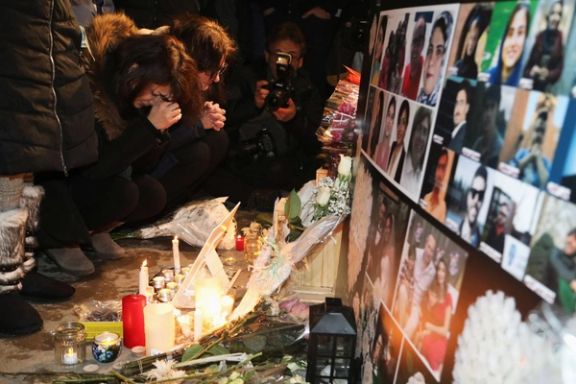
Families of victims of the Ukrainian airliner that was shot down by Iran’s Revolutionary Guard in 2020 seek to file a lawsuit against the regime in The Hague.
“With the expiration of the six-month period for the Islamic Republic of Iran to submit to binding arbitration for the downing of Flight PS752, it is anticipated that the case will be referred to the International Court of Justice in The Hague after June 28,” read a Wednesday statement by the Association of Families of Flight PS752 Victims.
Pinning hope on the International Coordination and Response Group for the victims -- comprised of Canada, Ukraine, Britain, and Sweden – the victims’ families said that “If the affected countries follow through as expected, it will mark the first time in history that the Islamic Republic will face an international tribunal for one of the thousands of crimes it has committed.”
In a statement issued on December 28, 2022, the International Coordination and Response Group called on Iran to submit to “binding arbitration of the dispute related to the downing of Flight PS752 by 2 surface-to-air missiles launched unlawfully and intentionally by members of Iran’s Islamic Revolutionary Guard Corps (IRGC) air defense unit...”
The victims’ families also organized a forum to discuss the issue and a rally in Toronto on July 5 to raise awareness about the tragic accident.
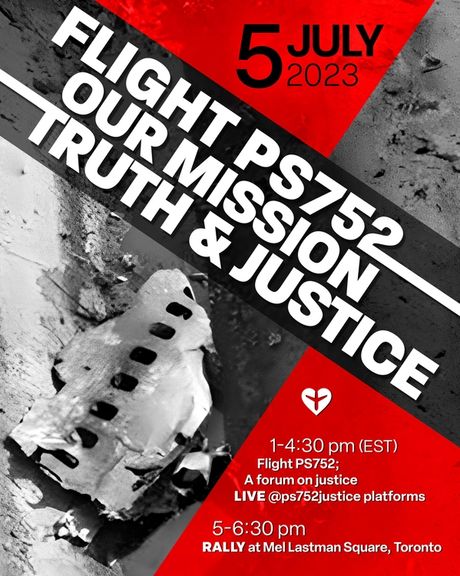
In September, lawyers representing the families submitted an Article 15 Communication to the Office of the Prosecutor of the International Criminal Court, providing information and evidence about crimes that occurred when Iranian missiles brought down the international flight.
The request was submitted in accordance with Article 15 of the Rome Statute, alleging that perpetrators have committed certain war crimes and crimes against humanity against the passengers and crew of flight PS752 and their surviving family members, including the war crimes of willful killing, intentionally directing attacks against the civilian population or civilian objects, as well as other inhumane acts.
The airliner was shot down by the IRGC on January 8, 2020, as it took off from Tehran’s Imam Khomeini International Airport. Only hours earlier, the IRGC had fired more than a dozen missiles at Iraqi bases hosting US and coalition troops in retaliation for the killing of the IRGC Qods Force Commander Ghasem Soleimani who was killed in Baghdad by a US drone strike just five days earlier. All 176 passengers and crew, including 63 Canadians as well as 82 Iranian citizens died in the disaster.
The Wednesday call to prosecute the perpetrators at the International Court of Justice came as the UN's top court said that the Islamic Republic has taken Canada to the ICJ for allegedly breaching Tehran's state immunity by designating it a sponsor of terrorism.
Canada listed Tehran as a terror sponsor in 2012 and severed diplomatic ties as relations frayed over Tehran's support for Bashar al-Assad's regime in Syria, its nuclear program, and threats against Israel. In 2016, a Canadian judge ordered Iran's non-diplomatic land and bank accounts in Canada to be handed over to victims of attacks by Hamas and Hezbollah.
Iran launched legal proceedings against Canada on Tuesday "concerning alleged violations of its immunities" as a sovereign state, the Hague-based ICJ said in a statement on Wednesday.
"Canada has adopted and implemented a series of legislative, executive, and judicial measures against Iran and its property in breach of its international obligations," Iran said in its filing to the court.
Iran has demanded compensation from Canada for the "violation of its international obligations,” and asked the ICJ to tell Ottawa to overrule any judgments against Tehran in Canadian courts.
The case is similar to the Iranian regime’s long-running claim at the ICJ against the United States for billions of dollars of assets frozen by US court rulings.
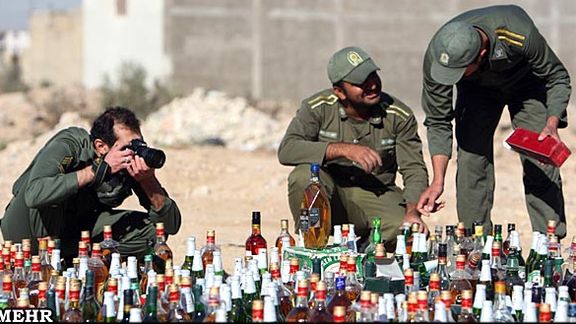
Amid rising deaths from bootleg alcohol across Iran, heated discussions have erupted on Persian social media about who is to blame for the deaths.
Homayoun Sameyah Najafabadi, a member of the parliament’s health committee, claimed Wednesday that Iran’s consumption of alcohol is higher than the countries where drinking alcohol is legal, likely driven by poor social and economic conditions which lead people to find escapism through substance abuse.
According to a survey by Iran Open Data, half of all adults regularly consume alcohol despite the Islamic regime’s ban, homemade alcohol a common way to skirt the bans. In 2018, a report by the World Health Organization (WHO) ranked Iran ninth among 189 countries for alcohol consumption per capita in spite of its being banned since 1979.
“Unfortunately, we see that the consumption of home-made alcoholic beverages in the country is increasing day by day, despite the many advertisements about its health issues, and this is undeniable,” said Najafabadi, a physician representing the Jewish minority at the parliament.
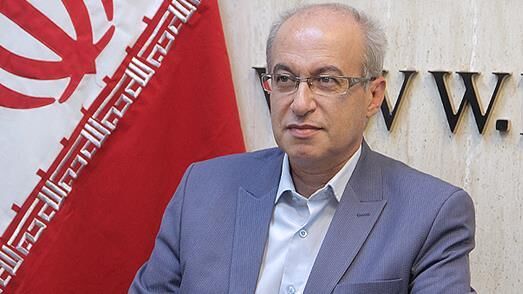
During the past several weeks, about 30 people have been killed and 250 people have been hospitalized for alcohol poisoning in different cities in provinces of Tehran, Alborz, Mazandaran and Hormozgan due to the consumption of methanol, the toxic variant of alcohol in contrast to ethanol.
Earlier on Wednesday, Amir Ahmadi, a prosecutor at one of the cities in Tehran province, said that two more people died and two lost their sight due to methanol poisoning.
Najafabadi says authorities need a better strategy to counter the consumption of alcohol beyond simply the threat of legal action, not least, the dangerous home brews which if made badly, can be fatal.
While the bans only feed people's hunger for what's prohibited, he said there are other reasons behind the rising consumption. “We must think about why alcohol consumption in Iran is even more than in countries where consumption is legal," he said.
There have always been reports of such poisonings across Iran, but the recent wave is significantly more widespread and deadlier, leading to rumors and speculations that the poisonings have been orchestrated by hardliners, like the wave of poisoning of schoolgirls which has affected hundreds of students throughout Iran since last year.
According to Deputy Health Minister Saeed Karimi, since the poisonings began on November 30, at least 13,000 female students were taken to medical centers due to suspected gas poisoning, while the regime has not done anything to find the perpetrators and instead cracked down on students, parents and teachers who protested the acts and journalists who reported them.
Now the current wave of alcohol poisonings has prompted different scenarios among Iranians. While hardliners believe those who drink alcohol to be sinners and criminals who deserve to suffer the consequences, ordinary people blame the regime for the deaths, underlining that most of the people who have died could be treated if they were taken to hospitals in time, but they hesitate because they are afraid of the consequences.
According to Abbas Masjedi Arani, the head of the Forensic Medicine Organization, 644 people died across Iran due to alcohol poisoning in the previous Iranian year (ended March 20), indicating a 30-percent rise compared with a year earlier.
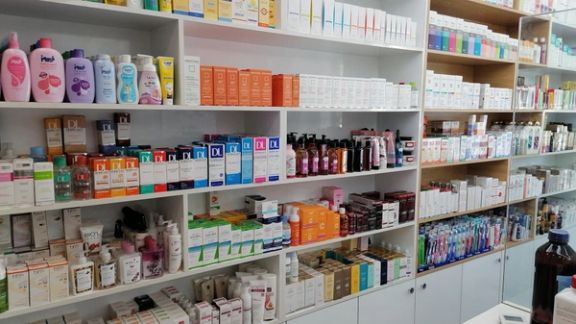
Shortages have hit Iran’s pharmaceutical industry which heavily relies on the cash-strapped government for hard currency to import raw materials.
The shortage of imported ingredients has disrupted production of medicines, pharmaceutical companies say and according to local media, around 200 different types of common medicines and drugs used by hospitals are scarce or unavailable now.
The situation was predictable and all government bodies including the ministry of health were aware that a shortage of medicine was to occur in the third and fourth months of the Iranian year which started March 21, Mohammad Abdzadeh, chairman of pharmaceutical companies’ union told the semi-official Mehr news agency Sunday.
Abdzadeh explained that it takes around four months from the time that the government provides the hard currency required for importing ingredients until the time the medicine become available in the market.

Donya-ye Eghtesad economic daily Monday quoted Hosseinali Shariari, chairman of the parliament’s health committee, as saying that he has written a letter regarding the shortage to Supreme Leader Ali Khamenei and “good news is being heard” about it.
Shahriari said there was a scarcity of around 180 different medicines, including those required for thalassemia patients and coagulation factor VII used to treat and prevent bleeding episodes in patients with Hemophilia A and B and that “and the list is getting longer.”
The media blame the government and the central bank for the shortage and its adverse effect on public health.
The government, which has been short of foreign currencies mainly due to US oil sanctions, has been exporting a lot more oil in recent months, nearly six times more than in 2019, at around 1.5 million barrels per day. However, Iran’s currency rial is near its all-time low and inflation remains high at more than 60 percent.
“How is that now after selling 1.6m barrels of oil per day, the government is unable to procure medicine like the previous government if it was so capable that it could import so much [Covid] vaccines when it came to office [in August 2021],” reformist Ham-Mihan newspaper asked Sunday, while pointing out that medicine is not included in the list of sanctions.
Many Iranians also wonder how the government is facing such a financial crisis if it is exporting around 700,000 more barrels of oil per day than in 2021.
“The psychological outcome of this situation is rising tension between people and the healthcare system, discontent with the government while its actual result is a decline in people’s life expectancy, particularly when [shortage of medicine] is coupled with food poverty which will definitely cause a drop in life expectancy,” the newspaper wrote.
Spokesman of Iran's customs said in November that the country had imported $2.8b of medicine and pharmaceutical ingredients in seven months.
While claiming that the country is producing 99 percent of its medicine requirements, the head of Iran's food and drug administration, Heydar Mohammadi had warned in February that the 690,000 billion rial budget (around $1.4 billion) allocated by the government for pharmaceuticals would only suffice for three months. According to Mohammadi, around 70 percent of ingredients for production of medicine must be imported.
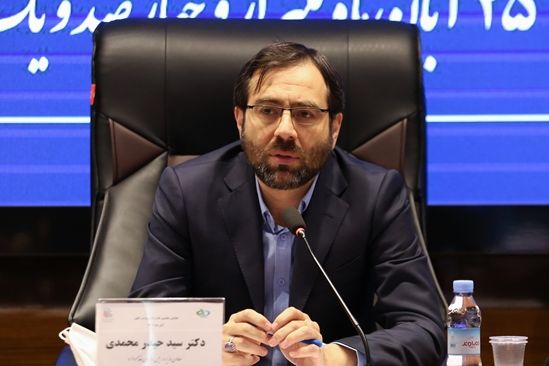
Claiming Sunday in an interview with the parliament’s news agency, that currently the situation is more “stable” compared to nine months ago, Mohammadi admitted that the slightest delay in providing hard currency could cause problems for the industry.
Officials including Mohammadi have also admitted that delay in payments by government agencies such as the welfare organization and insurance companies is also causing shortage of liquidity to pharmaceutical companies and affecting production.
In January an official of Iran’s drug importers union, Mojtaba Bourbour, challenged government officials’ claims about self-sufficiency in production of medicine and said not only up to 90 percent of raw material is imported from countries such as China and India, but also some medicines are imported from China but sold under Iranian labels.

The IRGC's intelligence agents have arrested the mother of a student who was detained and tortured during a protest rally against chemical attacks on schools.
An informed source told Iran International that the IRGC intelligence forces on Monday raided the house of Bita Shafiei Rad in Esfahan (Isfahan) to arrest her without a warrant, but as she was not home, they arrested her mother Maryam Abbasi Nikou.
Eight IRGC officers were involved, including two women who damaged goods in the home and confiscated the father's cell phone.
Abbasi Nikou, 42, has not contacted her family since her arrest, and the family is unaware of her condition and whereabouts.
Bita Shafiei Rad was arrested and temporarily released during a student gathering in April to protest chemical attacks on schools.
In the video message she published after her release, Bita said she is "seeking Iran's freedom".
"If you won’t be the voice of those who are in prison, they can do whatever they want. We should not be afraid of them, because our fear gives them strength," she added.
In mid-April, riot police in Shahinshar, central Iran, attacked a large crowd of people with tear gas and shotguns who were protesting ongoing gas attacks on schoolgirls.
Parents and students who gathered spontaneously outside the education department of Shahin-Shahr chanted anti-government slogans like “We don’t want a child-killing government.”
Chemical attacks on schools and poisoning of thousands of students in Iran continued for more than five months.
During this period, the Islamic Republic never accepted any responsibility for the attack claiming "collective fear" was the cause of the students’ sickness.